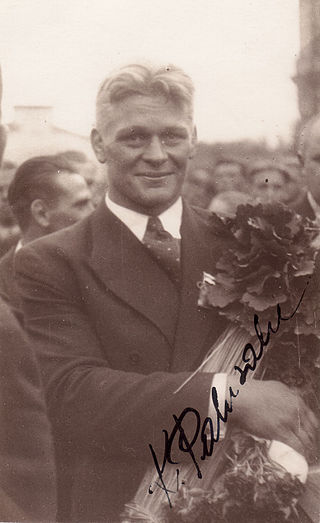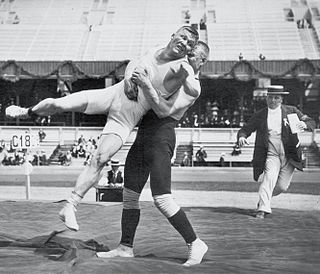Related Research Articles

Kuressaare is a town on the island of Saaremaa in Estonia. It is the administrative centre of Saaremaa Municipality and the seat of Saare County. Kuressaare is the westernmost town in Estonia. The recorded population on 1 January 2018 was 13,276.

Georg Karl Julius Hackenschmidt was an early 20th-century Estonian strongman, professional wrestler, author, and sports philosopher who is recognized as professional wrestling's first world heavyweight champion.

Kristjan Palusalu was an Estonian heavyweight wrestler and Olympic winner. Palusalu became the first and only wrestler in Olympic history ever to win both the Greco-Roman and freestyle heavy weight events.

Georg Lurich was an Estonian Greco-Roman wrestler and strongman of the early 20th century. Lurich was also the trainer of Estonian wrestlers and weightlifters Georg Hackenschmidt and Aleksander Aberg.

Kaido Höövelson is an Estonian politician and former professional sumo wrestler. Making his debut in May 2004, he reached the top division after just two years in sumo in May 2006. After suffering a number of injury problems in 2007 which delayed his progress, he reached the third-highest rank of sekiwake in November 2008, and was promoted to ōzeki rank after finishing the March 2010 tournament with a score of 14–1. He was a tournament runner-up four times before recording a top division championship in the 2012 January tournament. During his career Baruto also earned five special prizes for Fighting Spirit, one for Outstanding Performance and one for Technique. He lost his ōzeki rank after more injury problems at the end of 2012, and having fallen greatly in rank after withdrawing from the May 2013 tournament, he announced his retirement in September of that year at the age of 28.

Estonia competed at the 1936 Summer Olympics in Berlin, Germany. It was the last time that Estonia competed at the Summer Games as an independent nation until the 1992 Summer Olympics. After the nation was occupied by the Soviet Union in 1940, a number of Estonian athletes competed as part of the USSR delegations at the Summer Olympic games from 1952 to 1988.

Voldemar Väli was an Estonian two-time Olympic medalist in Greco-Roman wrestling.

Heiki Nabi is an Estonian Olympic champion Greco-Roman wrestler.

Martin Klein was an Estonian wrestler who competed for the Russian Empire at the 1912 Summer Olympics. He won the silver medal in the middleweight class, becoming the first Olympic medalist born in the territory of modern Estonia. In the semifinal against the reigning world champion Alfred Asikainen, the two grappled for 11 hours and 40 minutes on a sunny day outdoors, until Klein managed to pin Asikainen. Klein was so exhausted from the bout – the longest wrestling match ever recorded – that he was unable to wrestle for the gold the next day, leaving Swedish wrestler Claes Johansson with the gold medal.

Aleksander Richard Aberg was an Estonian professional Greco-Roman and free-style wrestling world champion of the early 20th century. He took part in the World Heavyweight Championship and was one of the three most famous Estonian professional wrestlers, along with Georg Lurich and Georg Hackenschmidt.

Eduard Pütsep was an Estonian wrestler. He competed in Greco-Roman wrestling in the 1920, 1924 and 1928 Olympics and won a gold medal in the bantamweight division in 1924, becoming the first Olympic champion in wrestling from Estonia. In 1928 he placed sixth in Greco-Roman and ninth in freestyle wrestling.

Johannes Kotkas was a heavyweight Greco-Roman wrestler from Estonia who won a gold medal at the 1952 Summer Olympics. He held the European title in 1938, 1939 and 1947 and placed second at the 1953 world championships.
Sport plays an important role in Estonian culture. Estonia first competed as a nation at the 1920 Summer Olympics, although the National Olympic Committee was established in 1923. Estonian athletes took part at every Olympic Games until the country was annexed by the Soviet Union in 1940. The 1980 Summer Olympics sailing regatta was held in the capital city Tallinn. Estonia has won most of its Olympic medals in wrestling, athletics, weightlifting, and cross-country skiing.

Väike-Maarja is a small borough in Lääne-Viru County, Estonia. It is the administrative centre of Väike-Maarja Parish.
Estonia participated in the Eurovision Song Contest 2019 with the song "Storm" written by Stig Rästa, Vallo Kikas, Victor Crone and Fred Krieger. The song was performed by Victor Crone. The Estonian broadcaster Eesti Rahvusringhääling (ERR) organised the national final Eesti Laul2019 in order to select the Estonian entry for the 2019 contest in Tel Aviv, Israel. The national final consisted of three shows: two semi-finals and a final. Twelve songs competed in each semi-final and six from each semi-final as determined by a jury panel and public vote qualified to the final. In the final, the winner was selected over two rounds of voting. In the first round, a jury panel and a public vote selected the top three to qualify to the superfinal. In the superfinal, "Storm" performed by Victor Crone was selected as the winner entirely by a public vote.
Kaarel Liidak was an Estonian agronomist, agriculture minister and politician, member and chairman of the National Committee of the Republic of Estonia from March to August 1944.
Wiedemann Language Award is an Estonian state award which is granted each year to one natural person for outstanding merits upon study, organisation, teaching, promotion or use of the Estonian language.
Rudolf Karelson was an Estonian linguist.
Ma näen su häält is an Estonian television mystery music game show series based on the South Korean programme of the same name. Since its premiere on 27 February 2022, it has aired two seasons on Kanal 2.

Helary Mägisalu is an Estonian wrestler.
References
- 1 2 3 4 "Richard_Karelson". esbl.ee. Retrieved 29 March 2022.